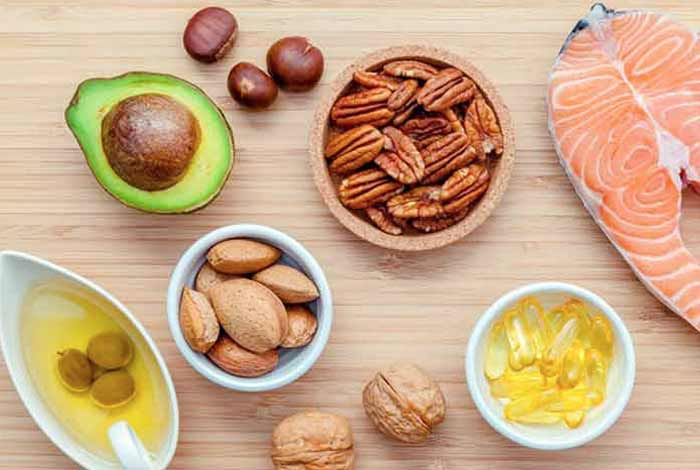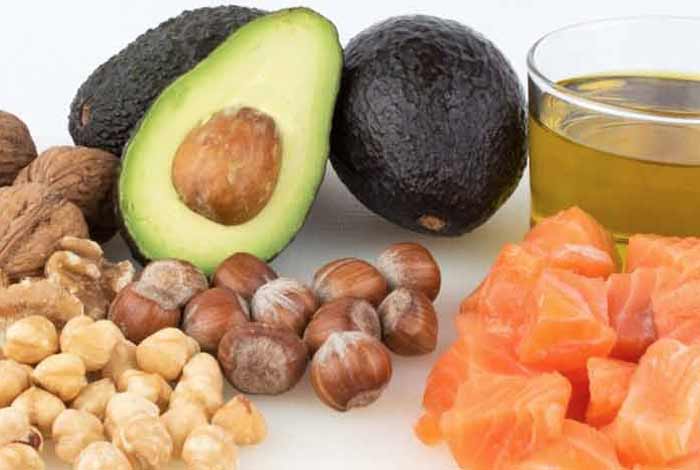
An Eye-Opening Guide to Good and Bad Fats

A lot of research has been conducted on fats, but it seems to confuse us all the more! There are conflicting opinions all over the Internet. Confusion arises from generalizations made by people regarding fat. They are discussed in ways as if there is no difference between good and bad fats.
Many fats are commonly present in our diet. But, the role of each of these and their effects on the body are all different. Even among the different groups of fat like saturated, polyunsaturated and unsaturated, specific fats have different functions and roles.
Continue reading to enhance your understanding about different types of fat in diet and their effects on health-positive and negative.
All types of fats (good and bad fats) have unique and different effects on the body. This information makes you well equipped to consider and make healthy and better dietary choices.
Some decades back, fat was thought of as a source of energy. So, people used to load up on fatty foods. As compared to other nutrients, fat has more calories. Over time, people came to know that several types of fats are better and healthier than a few others. It was found by Russian scientists, in 1930s, that animals, when given diets high on cholesterol, can lead to atherosclerosis in humans.
In this condition, there is building up of plaque in arteries. This narrows the arteries and increases the chances of having heart disease. One of the common causes of stroke and heart disease is atherosclerosis.
During the time of 1940s and 1950s, the incidence of heart disease reduced across many nations. People thought that it was due to wartime rationing in the World War II. And, this made the people to believe that that foods that were not allowed but were high in not being consumed, resulted in heart disease.
Some studies have revealed that smoking, high BP, dieting and weight gain are all risk factors for heart diseases. One such study is The Seven Countries Study. [1] This study has contributed in formulating the hypothesis that cholesterol in blood is increased by saturated fats leading to atherosclerosis and conditions of the heart. [2]
Some years ago, it was found that not all types of fat are bad. The risk of heart disease gets reduced with the consumption of unsaturated fats. [3]
Intense conclusions like “all of saturated fats are bad” and “we must all eat a diet low in fat” are not the right types of statements. This article summarizes the results of new and old research and clears out the confusions.
The Effect of Dietary Cholesterol Is Not that Great on The Heart
In animals and humans, liver makes cholesterol. The prime sources are animal products like fish oil or fish, egg yolks, animal fats and animal liver.
The amount or level of cholesterol made by the liver is adjusted in relation to what is being consumed. If large amount of cholesterol is taken in from the diet, the liver produces less of it.
As per some study findings, there is no relation between dietary cholesterol and stroke or heart attack. [4] Some studies also suggest that around 25% of the people have higher sensitivity to dietary cholesterol. In these people, dietary cholesterol increases both bad and good cholesterol. [5]

All Saturated Fats Are Not Bad
Unlike unsaturated fats, saturated fats do not have chemical double bonds. Because of this reason, these are more stable and are in a solid state at room temperature.
There is a lot of conflict regarding saturated fats and people have different opinions regarding how it affects the health.
People mistakenly consider all saturated fats as same. There are different types of saturated fats and these have different and unique effects on our health.
A feature that discriminates one saturated fat from the other is their length, i.e., the number of carbon atoms they bear. Fat molecules may have carbon atoms ranging from less than six to more than 22; thereby, making them short to very long.
A study has established that eating very long-chain fatty acids leads to decrease in the incidence of type 2 diabetes. Very long-chain fatty acids are found in canola oil or peanut oil. It is also important whether there are odd or even number of carbon atoms in the saturated fats.
A study that examined around 16,000 Europeans found that saturated fats that had even number of carbon atoms were related to type 2 diabetes. And, the ones, with odd number of carbon atoms, were related to lesser risk of the condition.
Saturated fats with even number of carbon atoms include stearate, present in meat, and baked goods. They are also found in palmitate, which is present in dairy, cocoa butter and meat. Another one is myristate, which is present in butter, palm oil and coconut butter.
Saturated fats with odd number of carbon atoms come mainly from dairy and beef.
Nutrition studies generally look at the effects of specific or individual nutrients. But, the point that must be noted is that even if there is the same type of fat but coming from different sources, it will have differently unique effects.
For instance, saturated fat, palmitate from lard leads to atherosclerosis in animals. However, if the source differs, i.e., if the palmitate comes from tallow, it does not cause the condition. [6]
Moreover, if the fats in lard are reorganized the way they are connected in tallow, the harmful effects can be reversed. [7]
Well, the important point is that specific type of food is more important than the type of fat present in it. For example, avocado has the same amount of fat (saturated) as bacon.
Eating around one and a half avocados reduces the levels of low-density lipoprotein (LDL) or bad cholesterol. Whereas bacon increases the level of bad cholesterol “LDL.” [8]
When you are planning your diet, try to incorporate a variety of healthy foods like vegetables, fish and nuts, instead of concentrating on individual fatty acids.
While studying the relation between health and saturated fats, researchers usually feel that saturated fats comes from cheese, dairy and meat.
In a regular American diet, 15% saturated fats come from carb-based desserts like cakes, pastries and cookies. The next 15% comes from junk foods, such as pizza, burger and chips and another 6% from dairy-based desserts. [9]

A study that examined adults up to the age of 25 years found that consuming cheese, yogurt and milk did not increase the incidence of heart disease and in fact, reduced the chances of stroke. [10]
Another study on meat revealed that those, who ate processed meat, had 20% more chance of having heart disease and death than those, who did not eat. [11]
It was also found in a research that people, who ate large amounts of red meat had 16% more chances of having heart diseases and death as compared to those, who did not. [12]
However, sometimes, people think that the effects of an unhealthy diet are due to saturated fats, but this is not correct.
Diets, having high content of saturated fats, have more calories and therefore, lead to weight gain. So, the conditions like heart disease may result from the intake of excessive calories and weight gain instead of saturated fats.
So, it is best to eat foods containing saturated fats in moderate amounts to avoid weight gain and curb the risk of any health conditions.
Industrial-Trans Fat Causes Heart Disease
When vegetable oil is hydrogenated – bombarded with hydrogen gas – trans fats are produced. In this process, unsaturated fats get converted into saturated and trans fats.
Some sources of trans fat are cakes, cookies, fried food and so on. Body treats fully hydrogenated oils as saturated fats. Trans fats are not familiar to the body and lead to atherosclerosis and heart disease. [13]
A study conducted over a period of 39 months that examined atherosclerosis in heart arteries of some men indicated that disease became worse in men who had more trans-fat. [14]
Atherosclerosis increases the chances of heart attacks. In a study, when people, who had heart attacks were examined, it was found that they had greater levels of trans fat in their fat cells as compared to their counterparts, who did not get heart attacks. [15]
Companies in the U.S. are now required to list down the amount of trans fat in a serving. If the product contains less than 0.5 gm, the companies round it off to zero. You must carefully read the ingredients. If it mentions “partially hydrogenated,” you must not use it too frequently.
Industrial trans fats are harmful, but natural trans fats present in meat and dairy products are beneficial and are not associated with heart disease.
Unsaturated Fats are Healthy for The Heart
Unsaturated fats have double-chain chemical bonds. Unsaturated fats are good for the heart. Some are better than the others. Their length or the number of carbon atoms, the position, and the number of double bonds have an impact on the body.
There are two types of unsaturated fats: monounsaturated fat, which have single double bond and polyunsaturated fat, which have 2-6 double bonds.
Benefits of Monounsaturated Fats
These are found in canola oil, olive oil and avocados. Also, these are found in nuts like walnut, almonds and cashews.
According to a study, people, who, consumed monounsaturated fats, had less chances of dying from heart disease than those, who did not eat or ate the least. [16]
Polyunsaturated Fats Are Better Than Monounsaturated Fats
These are present in vegetable and seed oils. As per a study, when foods containing unsaturated fats were replaced with polyunsaturated fats, there was a decrease in the incidence of heart disease by 19%. [17]
Health Benefits of Omega-3 Fatty Acids
These are a specific type of polyunsaturated fats. These are present in seafood like salmon, albacore tuna, herring, etc. High omega-3 is related to 10% lower risk of heart disease. [18]
People are bothered about eating a fish as it is a source of mercury, which can be poisonous when eaten in large amounts.
The U.S. FDA and EPA say that two to three servings of fish in a week is enough but that too, largely depends on the type of fish. It is recommended that fish with higher levels of mercury like marlin and swordfish should not be consumed.
Conclusion
The more you know about fats, the better will be your healthy food choices. Every type of food has a different and unique effect on the body. These could be good or bad.
Many studies club all sorts of fats together, but each saturated fat plays a different role in the body. Even the same type of saturated fats, but coming from different sources, may have different effects on the body. It may depend on what is the connection with other fats and what more is present in the diet. Saturated fats in dairy, poultry and vegetable oils is healthy for the heart.
Unsaturated fats are good for the heart, but trans fats are downright harmful. Small amount of trans fats may be harmless.
So, choose good fats like unsaturated fats, and avoid bad fats like partially hydrogenated and saturated ones as in processed meat. Knowing this will help you curb the risk of heart disease and ensure your longevity.










